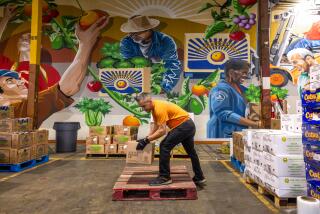Food Waste Increases in the U.S.
Your mention of the USDA food waste report by U.S. Department of Agriculture Secretary Dan Glickman July 2 caught my eye. I have just returned from the hunger relief conference to which you refer. All of us who are involved in food banking were taken aback to learn that the amount of food wasted in the U.S. has gone up in the past 20 years from 20% to 27%. It is my understanding that the 20% figure included crop loss, which the 27% figure does not. That means that food waste is even worse now than the numbers show. Food banking was born to prevent just this sort of waste of good food, such as mislabeled cans. The first food bankers saw this âwasteâ as food that could feed the hungry.
And it has. In the past 14 years, the Los Angeles Regional Foodbank has channeled more than 320 million pounds of food to the hungry. It keeps getting harder and harder for food banks to obtain donated food from all sectors of the food industry.
Moreover, the Emergency Food Assistance Program, a USDA program, just took a $20-million hit in Congress. This means that much less USDA commodities will be available to feed the hungry.
So hereâs the picture in L.A. More food is being wasted. Less food is being donated by the private sector, due to more efficiencies, more interest in selling âseconds,â and worst of all, in spite of strong good Samaritan laws that protect food donors, many retailers, caterers and others still insist that their surplus be dumped. Less food will be provided by USDA. Government programs are dwindling on all fronts. Still, this food bank, which supplies hundreds of thousands of people through neighborhood pantries, community centers and other helping charities, is expected to âpick up the slackâ after food stamp and other welfare cuts.
DORIS BLOCH, Exec. Dir.
Los Angeles Regional Foodbank
Re âNourishment Down the Drain,â editorial, July 4:
Anyone thinking that the problem of wasted food is a recent development is seriously out of touch with history. One only has to read âThe Grapes Of Wrathâ to realize that this situation has been going on for some time. The Joad family (along with untold others) starves while good food is left to rot on the ground, in order to drive up the price of that which remains.
While I agree that the problem is partly one of education--a small blemish does not render a piece of fruit inedible--the bigger issue is one of a misguided economic system that puts dollars before people.
JAMIE THOMPSON
Los Angeles
More to Read
Eat your way across L.A.
Get our weekly Tasting Notes newsletter for reviews, news and more.
You may occasionally receive promotional content from the Los Angeles Times.










